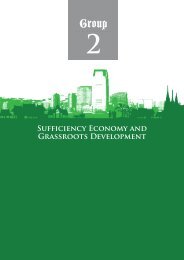Conflict, Legitimacy and Government Reform: Equitable Allocation of ...
Conflict, Legitimacy and Government Reform: Equitable Allocation of ...
Conflict, Legitimacy and Government Reform: Equitable Allocation of ...
You also want an ePaper? Increase the reach of your titles
YUMPU automatically turns print PDFs into web optimized ePapers that Google loves.
50 KPI Congress XI<br />
inheritance tax that aims at mitigating inequality <strong>and</strong> preventing<br />
speculative asset hoarding.<br />
Why were such drastic changes feasible in Japan? One reason was<br />
the earlier ruling class <strong>of</strong> Japan lost in World War II, stripping them <strong>of</strong><br />
their status <strong>and</strong> credibility <strong>and</strong> leaving a room for American consultants<br />
led by General McArthur to successfully implement policies to mitigate<br />
inequality. As a result, labor unions could negotiate with employers.<br />
In my opinion, one interesting point from Japan is generally many<br />
Japanese wanted a more equitable society <strong>and</strong> agreed with American<br />
consultants. Moreover, they could pass on the belief in the value <strong>of</strong><br />
equality until now.<br />
So-called ‘political will’ or the willingness <strong>of</strong> a government to<br />
implement policies to mitigate inequality is very crucial. Policies might<br />
change as time goes by. As observed over the past 10 years, income<br />
distribution in developed countries such as the United States, Engl<strong>and</strong>,<br />
France <strong>and</strong> Italy has turned sour because governments wanted to<br />
implement more liberal economic policies, resulting in reduction <strong>of</strong><br />
social security <strong>and</strong> welfare budgets, but income distribution in countries<br />
that still adopt welfare state policies such as Norway, Sweden <strong>and</strong><br />
Denmark is still in good shape.<br />
In our country, inequality have risen during the early stages <strong>of</strong><br />
economic development, which corresponds to Kuznets’ explanation, that<br />
is, saving concentration lies the h<strong>and</strong>s <strong>of</strong> a marginal number <strong>of</strong> people;<br />
pr<strong>of</strong>it increases at a faster rate compared to wages; income <strong>of</strong> urbanites<br />
rises faster than rural people <strong>and</strong> so forth. Inequality in Thail<strong>and</strong> have<br />
not subsided but still remained because opportunities which the masses<br />
can earn more are limited, especially those in rural areas. Furthermore,<br />
modern governments <strong>of</strong> Thail<strong>and</strong> have never initiated any mitigation<br />
policies to suppress inequality through fiscal policy <strong>and</strong> other policies like<br />
other countries cited above. In other words, Thail<strong>and</strong> never had a<br />
political will <strong>and</strong> labor unions <strong>and</strong> other social movements (e.g. farmers)<br />
have never been strong enough to pressure governments or become a














